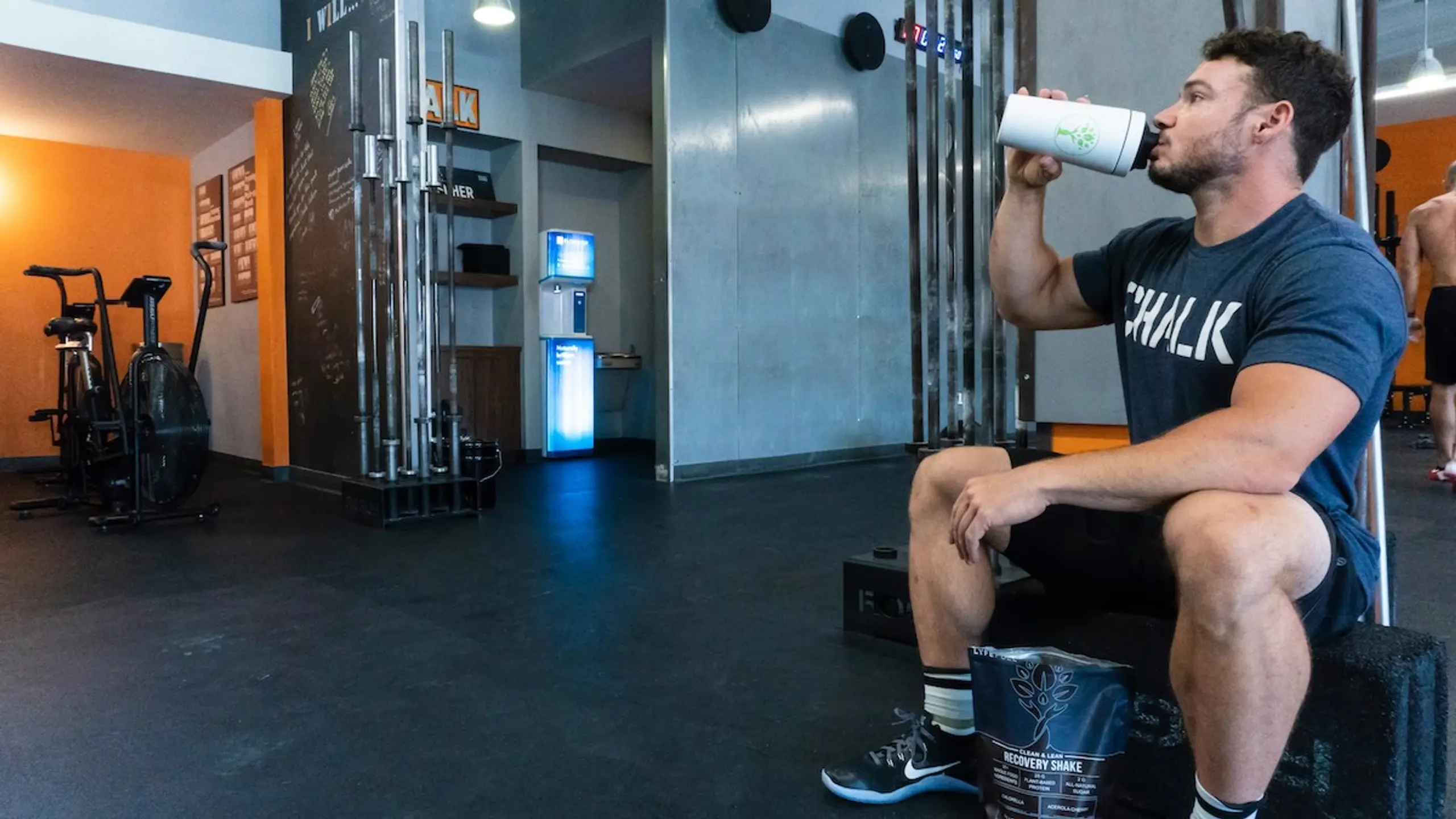
Jump to
Book a visit
$25 typical copay
$100 without insurance
Noticing changes in your bowel movements? Talk to a provider today.
A virtual primary care visit can help you understand what's normal, what’s not, and what to do next — all without leaving home.
Key takeaways:
- Protein is not a direct bowel stimulant and typically does not significantly affect your bowel movements.
- Both protein and fiber are necessary for good digestion, which can help prevent constipation.
- Depending upon your protein source, it can cause constipation or diarrhea.
Although protein does not act directly on your gut, a change in diet can result in a change in the consistency, color, size, and odor of your poop. Your digestive system needs water and fiber to function, and not all protein has a lot of fiber, particularly animal proteins.
Protein is available in the diet in different forms, including plant-based proteins and animal products. Proteins in animal products are generally low in fiber, but plant-based proteins can provide a good source of fiber, helping your digestion.
So, while protein may not necessarily make you poop, maintaining a diet rich in the types of proteins that aid in digestion can help you support your gastrointestinal system.
Does protein help with constipation?
Protein doesn’t directly help with constipation – that is, eating more protein won’t necessarily treat constipation or prevent it. In fact, a high animal protein diet can cause constipation if your daily intake does not include additional fiber.
Plant-based protein is a better source of fiber than animal proteins. To avoid constipation, your diet should balance proteins and fiber-rich food sources like whole grains or leafy green vegetables.
Does protein cause more frequent bowel movements?
You’re more likely to experience constipation related to protein intake than more frequent bowel movements or diarrhea. That’s because protein doesn't directly stimulate the bowels.
Some high-protein diets do not contain enough fiber for good digestion. The recommended protein intake for healthy adults is 10% to 35% of your total daily calorie intake. Protein makes you feel full, so you may be less likely to eat a proportionate number of fruits, vegetables, or whole grains.
One exception is protein bars and shakes, which have ingredients such as artificial sugars or dairy that can be difficult for many people to digest. This can result in diarrhea.
How long it takes for protein to affect bowel movements
It takes hours to days for food to be digested, so it can take hours to a day or two for protein to affect your bowel movements. Although protein does not directly affect your bowel movements, any dietary change can affect digestion, causing constipation or diarrhea.
In the case of protein, constipation is more likely, particularly if you decrease your fiber intake and follow a high-protein diet.
Choosing the right source of protein for digestive health
Protein is essential to health as a source of amino acids, the building blocks of proteins in the body. Foods considered high protein include meat, seafood, eggs, beans, nuts, and dairy products like cottage cheese and yogurts.
An ounce of most foods considered a good protein source is equal to about 7 grams of protein. This is equivalent to an ounce of meat or fish, a large egg, half a cup of beans or lentils, or a quarter cup of tofu.
However, some high-protein foods, like nuts and legumes, do contain fiber. This fiber may be soluble or insoluble, and both types support gut health. Insoluble fiber, in particular, helps you avoid constipation.
Choosing the right source of protein based on your needs can help you ensure you have a well-rounded diet. Here are some specific examples of protein sources that you may want to consider:
Animal proteins
Animal protein sources include fish, poultry, and beef. These protein sources do not contain dietary fiber.
If you eat a large proportion of animal proteins in your diet, you should be sure you are getting adequate dietary proteins from vegetables and other sources to promote good digestion.
Legumes
Beans, peas, and lentils are an excellent plant-based protein source. Popular options include kidney beans, navy beans, chickpeas, and pinto beans.
Nuts are another excellent source of protein from plants. However, be sure to consider the fat content in nuts. Nuts are a relatively high-calorie food, so they should only be one part of a plant-based protein diet.
Eggs
Eggs are a good source of protein, with over 6 grams of protein in a large egg. Eggs also supply various nutrients and fats.
Protein supplements
Protein supplements, including shakes and bars, may have additives like sugar alcohols or artificial sweeteners, which can trigger digestive changes and discomfort. If you are using a protein supplement, read the label and select supplements with minimal additives.
How too much or too little protein can affect digestion
Protein is an essential nutrient that breaks down into amino acids necessary for cellular function. You should get a minimum of ten percent of your diet as protein. To calculate your recommended protein intake in grams, multiply your body weight in kilograms by 0.36.
Effects of too little protein
Too little protein can negatively affect digestion. Without protein, the production of the enzymes your body needs to break down food can slow. This may lead to symptoms like bloating and make it hard for your body to absorb nutrients from the food you eat.
Other effects of too little protein include:
- Edema. The signs of inadequate protein in your diet can include edema, which refers to swelling in the body's tissues, particularly the legs and feet. People who are very malnourished, known as kwashiorkor, often have edema throughout the body because of low protein.
- Skin, hair, and nail problems. Protein is necessary for the formation of collagen and keratin, which are found in hair, nails, and skin. Protein malnutrition can result in flaky skin and dry, brittle hair and nails.
- Decreased immunity. Proteins are made up of amino acids necessary to produce antibodies against pathogenic organisms. Lack of protein can also affect the bacterial balance in your gut. It is essential to have good gut bacteria, as they increase your immunity and aid digestion.
- Poor wound healing. Low protein can result in poorly healing wounds. This occurs because protein is necessary for producing blood clotting factors and collage, which is essential to wound resolution.
- Loss of muscle mass. Proteins are necessary to sustain muscle mass. You can lose significant muscle mass after even a week of inadequate protein consumption. This is especially seen in older people and can affect their posture and balance.
Effects of too much protein
The more protein you eat, the longer it takes your body to sufficiently break down food. This results in a lasting feeling of fullness, but it can also lead to a slower digestion timeline, potentially causing constipation.
Although the exact amount of protein you should consume can vary based on your weight and digestive system, more than 2 grams per kilogram daily can lead to problems like kidney stones.
Another risk associated with some kinds of protein is consuming excess fat. Red meats, for example, are a source of protein, but they are often fatty, which could increase your risk of heart disease. Remember to avoid protein sources with highly processed carbohydrates and saturated fat.
Read our guides on how to encourage bowel movements and foods that can help you pass a bowel movement for more.
When to see a doctor about infrequent bowel movements or constipation
Although occasional constipation often resolves with hydration, some symptoms should prompt concern.
You should see a doctor if:
Talk to your doctor if you experience one or more of the following:
- Your constipation lasts longer than a week or two.
- You have blood in your stools.
- You have unexplained weight loss.
- Constipation is new, and you haven't changed your diet or lifestyle.
- Your poop has changed significantly in size, shape, color, or consistency.
You should go to the emergency room if:
Seek immediate medical attention if you:
- Experience severe pain with bowel movements.
- Have been unable to pass gas or have a bowel movement.
- Have blood in your stool.
Question to ask your doctor about infrequent bowel movements or constipation
- Are there foods I should avoid to prevent constipation?
- Are there foods that can help me maintain regular bowel movements?
- How much protein should I have in my diet?
- How much fiber intake is optimal to maintain a healthy digestive system?
Frequently asked questions: fiber and bowel movements
Here are some questions people with constipation frequently ask their healthcare provider:
Does protein make you gassy?
Although many people believe that protein makes them gassy, there is no objective evidence of this.
However, it is possible that a change in diet that emphasizes protein can change the gut's bacterial balance, which can increase flatulence. Additionally, other ingredients in protein bars and shakes are more likely to cause any gas associated with protein consumption.
Do protein shakes make you poop?
A high-protein diet is more likely to cause constipation. If you increase the protein in your diet, pay attention to the balance of protein with dietary fiber.
Takeaway message: protein can cause constipation
In most cases, protein is more likely to cause constipation than help it. It’s more likely to cause constipation than diarrhea, although it can cause either of these conditions, depending upon your digestive system and the type of protein source.
Many high-protein food sources, like meat or fish, do not contain fiber. Plant-based proteins generally have more fiber content compared to animal proteins. So, if you decide to follow a high-protein diet, be sure to consult your healthcare provider.
General Medicine follows a strict editorial process, including using real experts to write our articles, vetted primary sources, fact-checking, a secondary medical review, and updates as necessary. This article was medically reviewed and fact checked by Dr. Lane Thaut, DO.
Sources
Carbone JW, Pasiakos SM. ”Dietary protein and muscle mass: Translating science to application and health benefit.” Nutrients. 2019;11(5):1136. doi:10.3390/nu11051136, https://doi.org/10.3390/nu11051136.
"Definition & Facts for Constipation." National Institute of Diabetes and Digestive and Kidney Diseases, National Institutes of Health, 1 May 2018, www.niddk.nih.gov/health-information/digestive-diseases/constipation/definition-facts. Accessed 20 Nov. 2024.
Moon, Jaecheol, and Gwanpyo Koh. "Clinical Evidence and Mechanisms of High-Protein Diet-Induced Weight Loss." Journal of obesity & metabolic syndrome vol. 29,3 (2020): 166-173. doi:10.7570/jomes20028, https://pmc.ncbi.nlm.nih.gov/articles/PMC7539343/.
U.S. Department of Agriculture (USDA). “MyPlate.” U.S. Department of Agriculture, http://www.myplate.gov/. Accessed 20 Nov. 2024.
MedlinePlus. "Protein in Diet: MedlinePlus Medical Encyclopedia." MedlinePlus - Health Information from the National Library of Medicine, http://medlineplus.gov/ency/article/002467.htm.
Our editorial standards
At General Medicine, we cut through the clutter to make health care clearer, faster, and easier to navigate. Every article is grounded in evidence-based research and peer-reviewed journals, reviewed by medical professionals, and written in accessible language that helps you make health decisions with confidence. We’re committed to ensuring the quality and trustworthiness of our content and editorial process by providing information that is up-to-date, accurate, and actually useful. For more details on our editorial process, see here.



